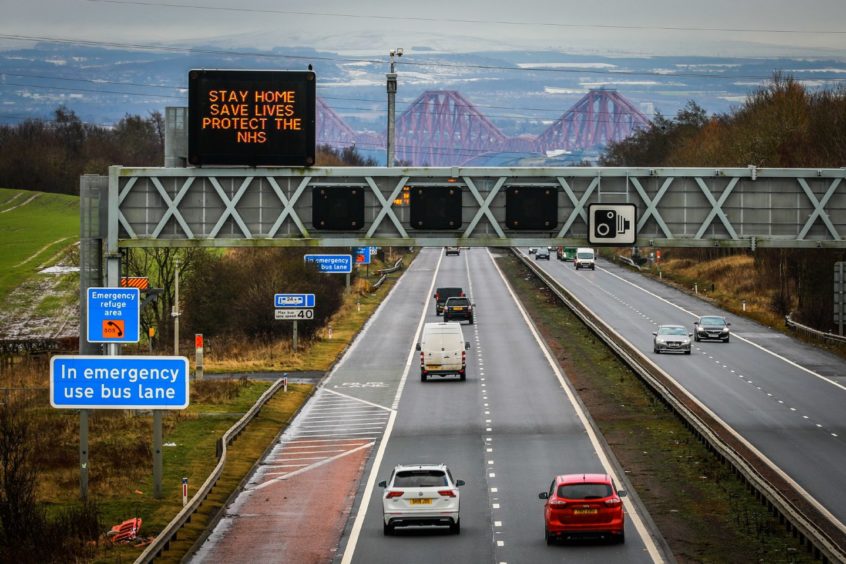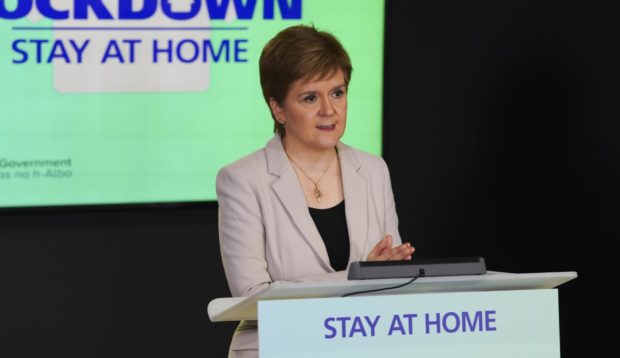Takeaways, non-essential click and collect services and construction could be restricted further as ministers ponder even tougher lockdown measures after Scotland recorded its highest-ever daily coronavirus death toll.
Nicola Sturgeon said on Friday that 93 virus-related deaths had been recorded in the past 24 hours, eclipsing the previous daily high of 84, while 1,530 patients were being treated in hospital – another grim record and 10 more than the previous peak, in April.
The first minister said the daily death figure includes some people who died over Christmas and New Year but that it was still “distressingly high” and emblematic of the “severity of the pressure” hospitals are facing.
New modelling data published by the Scottish Government estimates there was a 16% rise in “contacts within the home” over the festive period and the R number – or how many people each infected person passes the virus on to – could be as high as 1.3.
Scientists estimate up to 10,000 people are now being infected with Covid-19 every day, with experts warning the new, more transmissible strain of the virus is “increasing rapidly in Scotland” and is “very likely” to increase in dominance.
Further restrictions
All of mainland Scotland and Skye were placed into level four restrictions from December 26 before a full lockdown was enforced earlier this week.
But Ms Sturgeon has warned even tougher measures may be needed to keep the virus from spreading further out of control, amid concerns over the number of people still using the country’s road and public transport networks.

She said: “I have spoken previously this week about the kind of areas that we are looking at. For example, do we need to restrict services like click and collect a bit more?
“I’m not suggesting we would stop people doing that for essential services, like food, but for non-essential shopping. Do we need to restrict takeaway services a little bit more, so there are fewer places staying open?
“Non-essential construction, for example, is another area that we’re looking at. And also, are we getting the message across loudly and clearly enough, and do we think it is being heeded enough, that people should be working from home and employers should be facilitating home working as far as possible.”
The new variant has already caused chaos across the UK, with London mayor Sadiq Khan declaring a “major incident” on Friday as it threatened to “overwhelm” hospitals. A major surge in cases in Dumfries and Galloway was also attributed to the strain.
Interim deputy chief medical officer Dr Dave Caesar stressed cases in Scotland “could have been worse” if restrictions had not been put in place over the festive season but warned the country is “not out of the woods yet”.
“Our case numbers are high, they’re not as high as they could have been if we hadn’t taken the measures that we undertook from Boxing Day,” he told the BBC.
“Our health system is under serious pressure but is coping. I hate to say it, but it could have been worse by this time in January.
“We’re not out of the woods yet, by any stretch of the imagination, but I suppose we’re holding our own in very significantly challenging circumstances.”
Cabinet Office minister Michael Gove said this week that lockdown restrictions in England could remain in place until March.
When asked about the possibility for the same timeframe in Scotland, Dr Caesar said: “I don’t think anything is ruled out, but the quicker that we can control this virus, the quicker we can release these restrictions, undoubtedly.”
Ms Sturgeon refused to commit to a promise made by Prime Minister Boris Johnson that elderly and vulnerable people – including those in Scotland – will be vaccinated by February 15.
The first minister said she was “not going to stand here and give hard and fast commitments before I am sure we have supply”.
She also confirmed plans to introduce from next week a scheme to make sure international passengers test negative for Covid-19 before travelling to Scotland and other parts of the UK.
In a move that Edinburgh University Professor Linda Bauld said the UK was one of the last countries in the northern hemisphere to introduce, travellers will be asked to present a result from the three days before they travel.
